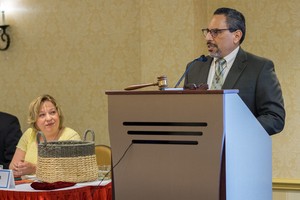Following the announcement of his appointment yesterday as the interim executive director of the Presbyterian Mission Agency (PMA), Luis Antonio (Tony) De La Rosa had an opportunity to further elaborate on his priorities and his sense of call at a brief news conference.
In his remarks to the Presbyterian Mission Agency Board (PMAB) earlier that afternoon, De La Rosa, a commissioned ruling elder, spoke about the new initiatives he introduced during his tenure as interim lay pastor of Newport Presbyterian Church in Bellevue, Wash.
“I have been teaching courses on race and privilege in a largely white congregation that wants to hear that message,” said De La Rosa.
Following up on that theme, he said during the news conference that the PC(USA)’s theological institutions are particularly well positioned to address issues of social justice.
“My hope is that they can take the lead and demonstrate to the rest of the church how technology can be used to move the conversation forward,” he said.
A seasoned interim leader with recognized gifts in shepherding organizations through periods of transition, De La Rosa commented on the “monumental task of seeing PMA through its mission at this time.”
“I think there is a lack of trust in the church,” he said. “I think there is a lack of trust in the country. At the root of that is the fear of change. One thing I learned in interim ministry is how congregations respond in times of anxious change by expressing distrust of traditional institutional structures. Those structures are often blamed when they can’t perfectly navigate through those changes. The part of leadership is to address some of that anxiety and to redirect the energy toward the creative responses.”
A lifelong Presbyterian, De La Rosa said that he was most excited to be working with people with whom he has grown up in the PC(USA).
“The ability to come together with other friends is what I consider to be one of the greatest joys and privileges of this call,” he said.
On a lighter note, De La Rosa said that among his greatest fears will be to have eaten too many “Hot Browns”—Louisville’s signature open-faced turkey sandwich with bacon and Mornay sauce, created in the 1920s at the city’s storied Brown Hotel—by year’s end.
“I would also say that what I think I most fear is not being able to address some of the anxiety,” he quickly added. “It’s not an ever-present fear for me, but it drives what I will be doing.”
Asked again to respond to how long the interim would serve, the Rev. Marilyn S. Gamm, chair of the PMAB, reiterated that the expectation would be 1-3 years.
“You’ve heard [PC(USA) Moderator] Heath Rada’s call to the church and the kinds of concerns he lifted up—structure, finances—that are huge, and that can’t be magically solved overnight,” said Gamm. “It will take time for Tony to get a handle on the complexity of the issues that are before us. We don’t know how long the elected search will take. We thought it was important to take enough time in the interim search to find the best person to serve at this time. We don’t want the elected search committee to feel constrained, neither do we want Tony to feel constrained. We are trying to leave enough flexibility to not hamstring the Spirit and not unduly tie his hands.”
De La Rosa said that in his first 100 days—which begins Dec. 1, 2015—he hopes he will have met everyone who wants to meet him, which he said may take 100 days.
“I would hope that we would have by the first 100 days some greater clarity and insight into the precise financial shape of the agency and that it will be made known and clear,” he said. “It may take a while to get the analysis behind the numbers and do the trending and forecasting. We will probably be working with the board to begin to hammer out the budget for presentation to the General Assembly in the light of that financial research.”
He also said he very much looks forward to doing a lot of listening across the church.
“Presbyterians are not shy about giving their opinions on things,” De La Rosa said. “My hope is that in some of those messages we can see a definite trend of hope and creativity.”
He pointed to the new worshiping communities movement, in which he was a regular participant during his tenure as interim executive presbyter of the Presbytery of New York City.
“I think that there are voices of hope and creativity being sounded in our denomination,” he said. “They are just not being heard.”

